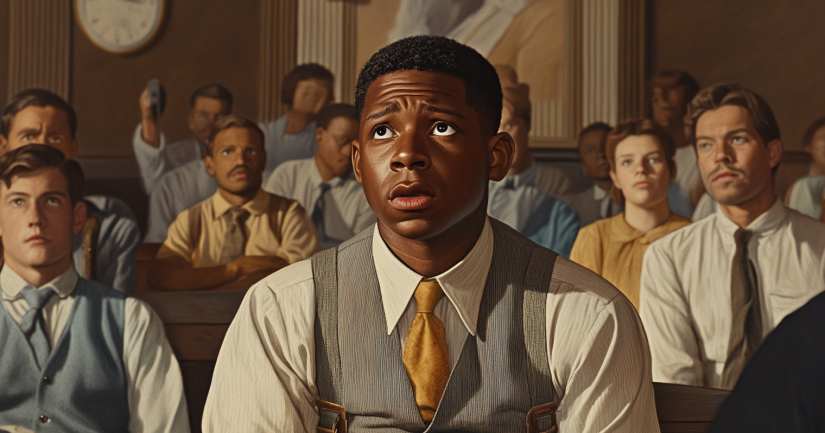
Religious fervor, scientific truth, and moral conviction collide in this Inherit The Wind True Or False Quiz, designed to test how well you remember the facts, events, and deeper meanings behind Jerome Lawrence and Robert E. Lee’s powerful courtroom drama. Based on the real-life Scopes “Monkey Trial,” Inherit the Wind uses fiction to explore freedom of thought and the right to question societal norms. This quiz goes beyond basic recall it challenges your grasp of plot, character motivations, themes, and the symbolic weight of each pivotal moment.
Whether you’re studying for class, preparing a performance, or revisiting the play’s gripping narrative, these true-or-false statements will sharpen your critical eye. Each question cuts to the core of the play’s messages about courage, conformity, education, and belief making it an excellent tool for both review and reflection.
Think you can separate fact from fiction in Inherit the Wind? If you enjoyed this quiz, take on the Inherit The Wind Quote Identification Quiz and see if you can match the lines to their speakers. Then, put your sequencing skills to the test with the Inherit The Wind Order Of Events Quiz. When you’re ready, challenge yourself with the Inherit The Wind Full Book Quiz and prove your knowledge of the entire play!
Your Inherit The Wind True Or False Quiz Starts Here – Are You Ready?
What This Inherit The Wind True Or False Quiz Covers
Expect statements from all three acts of the play, touching on:
- Plot points and courtroom events
- Character relationships and turning points
- Famous quotes and their speakers
- Thematic elements like freedom of speech and the conflict between science and religion
- Historical connections to the Scopes Trial
- Literary and symbolic devices used by the playwrights
Each answer comes with a brief explanation to clarify the truth behind the drama.
Sample Statements You’ll Be Asked to Evaluate
Here’s the kind of content you’ll explore:
- Bert Cates is put on trial for teaching the theory of evolution in a public school.
- Rachel Brown is a newspaper reporter covering the case.
- Henry Drummond defends Brady during the courtroom trial.
- Matthew Harrison Brady is based on a real-life political figure.
- The judge allows Drummond to call scientists to the witness stand.
- Drummond humiliates Brady by cross-examining him about the Bible.
- The play ends with Drummond leaving Darwin’s book behind on the judge’s bench.
- The townspeople unanimously support Cates’s right to teach evolution.
- Rachel ultimately leaves her father’s house to find her own beliefs.
- Drummond and Brady are portrayed as absolute opposites with no shared respect.
These questions help you think beyond memory, requiring interpretation of character arcs, symbolism, and dialogue.
Why This Quiz Enhances Your Understanding
True-or-false quizzes force you to evaluate each fact in context. In Inherit the Wind, truth and belief are often in tension, and this format reflects that same conflict. By engaging with these statements, you’ll:
- Solidify your understanding of key events and relationships
- Clarify common misconceptions about characters and themes
- Deepen your awareness of how plot and theme are intertwined
- Reflect on the real-world parallels to the fictionalized trial
Whether you’re new to the play or revisiting it for deeper insight, this quiz format reinforces what matters most.
Fun Facts That May Help You Along the Way
- Although fictionalized, Brady and Drummond are closely modeled after real Scopes Trial figures: Bryan and Darrow
- The name “Inherit the Wind” comes from Proverbs 11:29, symbolizing the futility of blind zealotry
- Rachel represents the internal conflict between loyalty and intellectual freedom
- The character of Hornbeck, the cynical reporter, is loosely based on H. L. Mencken
- Despite being opponents, Drummond and Brady once respected each other—adding depth to their rivalry
Who Should Take This Quiz
Perfect for:
- Students preparing for literature exams or classroom discussions
- Teachers building review activities around the play’s key concepts
- Actors learning character nuance and motivation
- Book clubs and theatre groups analyzing dramatic structure and ideology
- Anyone who loves courtroom drama with intellectual weight
This quiz supports comprehension, analysis, and interpretation, making it a valuable tool for all levels.
Question Belief, Defend Thought—One Statement at a Time
In a play that puts the right to think on trial, Inherit the Wind reminds us that truth is often tangled in belief. This True Or False Quiz lets you unpack those ideas, line by line, and decide what really happened in Hillsboro and what it means for us today.
Take the quiz now and put your knowledge to the test. How well do you know the facts behind the fiction?
Inherit The Wind Quizzes: Analyze the classic courtroom drama …
Inherit The Wind General Knowledge – FAQ
Inherit the Wind is a play that dramatizes the famous 1925 Scopes Monkey Trial. It centers on the courtroom battle between two legal giants over a teacher’s right to educate his students about Darwin’s theory of evolution, challenging a law that mandates the teaching of creationism.
The central characters include Henry Drummond, a defense attorney representing the teacher; Matthew Harrison Brady, the prosecutor and a staunch creationist; and Bertram Cates, the teacher on trial.
The play explores several themes, including the conflict between science and religion, the right to think and the freedom of thought, and the societal struggle between progress and tradition. It also delves into the nature of public opinion and the role of media in shaping it.
Inherit the Wind is significant because it tackles enduring issues that resonate with audiences today. It raises critical questions about intellectual freedom and the tension between differing worldviews. Its historical basis and powerful dialogue continue to provoke thought and discussion.
The playwrights, Jerome Lawrence and Robert E. Lee, took creative liberties to emphasize the play’s themes and messages. The work is more a reflection on contemporary social issues than a strict retelling of history.
